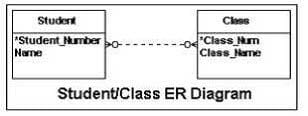Exam Details
Exam Code
:1D0-541Exam Name
:CIW v5 Database Design SpecialistCertification
:CIW CertificationsVendor
:CIWTotal Questions
:128 Q&AsLast Updated
:Mar 24, 2025
CIW CIW Certifications 1D0-541 Questions & Answers
-
Question 81:
The creation of intermediate entities occurs during the logical database design phase for an enterprise. It is used to resolve which types of relationships?
A. One-to-many, complex, and recursive
B. Complex, recursive, and many-to-many
C. Redundant, recursive, and many-to-many
D. One-to-many and one-to-one
-
Question 82:
Which subset of Structured Query Language (SQL) is used to perform operations such as data retrieval or deletion on the data contained in a database?
A. Data Control Language
B. Data Definition Language
C. Data Formatting Language
D. Data Manipulation Language
-
Question 83:
What is a relational database domain?
A. A group of attributes
B. A set of permissible tuple values
C. A collection of related data items
D. A set of permissible attribute values
-
Question 84:
Consider the entity-relation (ER) diagram shown in the exhibit. When the logical database design phase is completed, which of the following is a valid DBDL description of the base relations for the ER diagram?

A. STUDENT( Student_Number: integer NOT NULL Name: variable length character string length 20 NOT NULL) Primary Key Student_Number CLASS( Class_Num: integer NOT NULL Class_Name: integer NOT NULL) Primary Key Class_Num
B. STUDENT( Student_Number: integer NOT NULL Name: variable length character string length 20 NOT NULL) Primary Key Student_Number CLASS( Class_Num: integer NOT NULL Class_Name: integer NOT NULL) Primary Key Class_Num Foreign Key Class_Num References STUDENT
C. STUDENT( Student_Number: integer NOT NULL Name: variable length character string length 20 NOT NULL) Primary Key Student_Number STU_CLASS( Student_Number: integer NOT NULL Class_Num: integer NOT NULL) Primary Key Student_Number CLASS( Class_Num: integer NOT NULL Class_Name: integer NOT NULL) Primary Key Class_Num
D. STUDENT( Student_Number: integer NOT NULL Name: variable length character string length 20 NOT NULL) Primary Key Student_Number STU_CLASS( Student_Number: integer NOT NULL Class_Num: integer NOT NULL) Primary Key Student_Number CLASS( Class_Num: integer NOT NULL Class_Name: integer NOT NULL) Primary Key Class_Num
-
Question 85:
What is a domain?
A. A normalized set of data applicable to a particular relation
B. A combination of attributes for a relation
C. A definition of permissible values for one or more attributes
D. A set of permissible values for one or more relations
-
Question 86:
Consider the following relational algebraic expression:
Which of the following SQL statements is equivalent to this relational algebraic expression?
A. SELECT Sales_Rep_No(108) FROM Orders;
B. INSERT INTO Orders VALUES(Sales_Rep_No = 108) WHERE Sales_Rep_No = NULL;
C. SELECT * FROM Orders WHERE Sales_Rep_No = 108;
D. SELECT * FROM Orders WHERE Sales_Rep_No = 108;
-
Question 87:
Which concurrency control method should be used only when conflicts between transactions rarely occur?
A. Locking
B. Time stamps
C. Optimistic
D. Serialization
-
Question 88:
Consider the Information Engineering diagram in the exhibit showing the relations BUILDING and RESIDENT. What is the relationship between BUILDING and RESIDENT?

A. 11
B. 1n
C. n:m
D. m:n
-
Question 89:
Which three pieces of information did E. F. Codd describe as necessary to retrieve a data value from a relational database?
A. Attribute, domain, and tuple
B. Entity, relation name, and domain
C. Table name, primary key, and entity
D. Attribute, relation name, and primary key
-
Question 90:
Which term describes the rejoining of relations that have been decomposed?
A. Normalization
B. Denormalization
C. Referential integrity
D. Domain constraints
Related Exams:
1D0-435
CIW JavaScript Fundamentals1D0-437
CIW PERL FUNDAMENTALS1D0-510
CIW v5 Founfations1D0-520
CIW v5 Site Designer1D0-525
CIW v5 E-Commerce Designer1D0-541
CIW v5 Database Design Specialist1D0-571
CIW v5 Security Essentials1D0-610
CIW Web Foundations Associate1D0-61A
CIW Internet Business Associate1D0-61B
CIW Site Development Associate
Tips on How to Prepare for the Exams
Nowadays, the certification exams become more and more important and required by more and more enterprises when applying for a job. But how to prepare for the exam effectively? How to prepare for the exam in a short time with less efforts? How to get a ideal result and how to find the most reliable resources? Here on Vcedump.com, you will find all the answers. Vcedump.com provide not only CIW exam questions, answers and explanations but also complete assistance on your exam preparation and certification application. If you are confused on your 1D0-541 exam preparations and CIW certification application, do not hesitate to visit our Vcedump.com to find your solutions here.